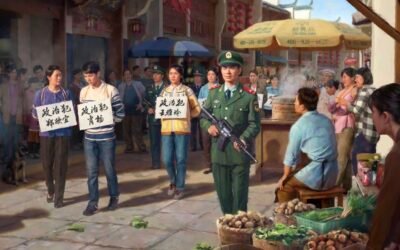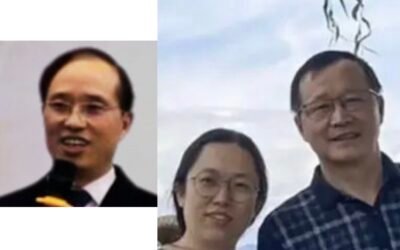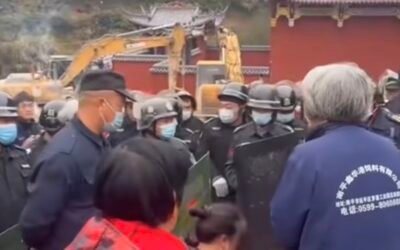Last year, we reported how one Jewish gentleman gathered attention with his solitary protest in London. Now, Jewish support for Uyghurs is growing everywhere.
by Ruth Ingram

Poster for the Solidarity Iftar with the Uyghurs (from Facebook)
Table of Contents
“Never again”
Jewish support for the Uyghur cause is gathering momentum around the world, spurred on by a common tragedy of intense suffering and persecution at the hands of an alien and merciless power. From the “Lonely Jew,” and his faithful weekly protest in London, covered by Bitter Winter in June last year, to vigorous Jewish lobbies rattling the seats of world powers, world Jewry has woken up to a cause that mirrors their own, one that was exposed to the world 75 years ago with Victory in Europe.
In the post-Second World War spirit of “never again,” Jewish movements have stepped up to protest against atrocities being meted out to millions of Uyghurs both at home and among the diaspora since August 2016, when Chen Quanguo became Chinese President Xi Jinping’s hatchet man in the Uyghur homeland of Xinjiang. Only recently did the Holocaust Memorial Museum in Washington describe the systematic incarceration of vast swathes of the Uyghur population as “crimes against humanity,” and Jewish World Watch lend its full weight to The Uyghur Human Rights Policy Act 2020 (approved by both the US Senate and the House, and waiting for President Trump’s signature), which it describes as “a cornerstone of Jewish World Watch’s engagement with the Uyghur crisis.”
A sad Ramadan: Jews offer support
But macro political action, vital as it may be in an attempt to turn the advancing tide of abuse against Uyghurs, only skims the surface of the heart wrenching grief and deep sorrow amongst the diaspora, which is accentuated during the month of Ramadan. The both solemn and exuberant month of fasting and feasting with family and friends, echoes with indelible memories of childhood, large family get togethers, and cultural expressions of nationhood. Despite a clampdown on fasting in Xinjiang particularly latterly, the month still evokes in many minds celebrations, lavish festive gatherings, and special delicacies following the days of abstinence.
With contact now severed with the homeland and everything familiar lost, perhaps forever, each year of separation intensifies, rather than diminishes the pain. To address the keen sense of loss and isolation among the diaspora in London, and to speak up in their suffering, UK Jewish groups and scores of concerned individuals came together online this Ramadan, to stand with their Uyghur compatriots and listen to their stories.
Uyghurs tell their stories
Rahima Mahmut, Uyghur activist, musician, and project director of the World Uyghur Congress in London (WUC) speaking at this unique event organized by the Jewish human rights organization René Cassin with the Liberal Jewish Synagogue, was deeply touched. She said that this year’s long Ramadan summer days and nights had been spent alone in her London flat. To be surrounded by Jewish friends at this time was heartwarming for her, and important for Uyghurs. The COVID-19 lockdown this year had intensified their feelings of isolation and pain during what should usually be “a most beautiful month for Muslims,” she said.
That the Jewish community in London had reached out to her, and other Uyghurs and gathered to break the fast together in this way, was profoundly moving and gave her strength to carry on. Describing “beautiful memories” of an idyllic childhood in a large religious family of 10 children, in Ghulja, a city bordering Kazakhstan in the north west of Xinjiang, she remembers the togetherness, the fun, and the feelings of belonging to a warm, extended family. Since 2017 and the intensification of clampdowns, when the danger of contact with her family became too great for them, the pain of each passing year has become unbearable, she said.
Uyghur social media is awash at this time with stories of separation and heartbreak. Omerjan Hamdullah, whose brothers’ arbitrary detention and disappearance was featured in Bitter Winter in January, is still in the dark as to their fate. For him there is no happiness in the Eid festival. “I am in mourning every day and am in pain.” Arzu Sultan in a heartwarming video on Twitter shows her daughter in a new Eid Uyghur national dress. She has never seen her father. He is detained somewhere in the homeland. Yasar Hamdullah plays a favorite song of his father who is languishing in what he calls a “Chinese dungeon” on his Twitter feed.
A Jewish-Uyghur event in London
After a welcome from Dolkun Isa, Chairman of the World Uyghur Congress from Germany, who has his own tragic story of loss and flight from the homeland in 1980, Uyghur guests at the London Iftar included Dilnaz Kerem, a 17-year-old student, who spoke of her own father’s historical imprisonment, his torture and subsequent flight to Norway. They, in common with the entire diaspora, have lost touch with their 80-year-old grandmother, all their aunts, uncles, and cousins. Ramadan for them has meant worry about their family back home in the face of “terrifying news we have heard about the conditions.” She asked how the Chinese Government had the right to “brainwash innocent people” in the camps, and now force thousands to work as slaves in factories. “I have the right to know whether the ones I love are alive or dead,” she said bitterly.
Kurbanisa, a Uyghur exile now living with her husband and children in London, was grateful for Jewish solidarity amid the pain of estrangement from her land and people. She could hardly believe the world’s silence concerning the assault on her relatives and friends in Xinjiang. “How can this be happening in the twenty-first century?” she asked. A powerful force crushed the Jews in the first Holocaust, she said. Now it was the turn of the Uyghurs. “It makes me wonder who will be next?” she asked. “The world must come together to stop China,” she pleaded. She struggled to find words to explain the deep emotional and spiritual trauma experienced by her family because of this attack on her nation. “This affects my entire life,” she said. “But not only mine. This is the reality for all Uyghur people wherever they are in the world.”
Another guest, Aisha, described her stressful life as an exile, far from home, but hungry for every morsel of news about her people. “I cannot live without knowing what is happening to them,” she said. Jewish solidarity brought great comfort, she said, and not least for the fact that their beliefs did not regard fasting as a crime. She spoke of life back home, where they were forbidden not only to practice their religion but also to express their culture. A small financial gift she sent to her mother on Mother’s Day in 2017, resulted in the cutting off all contact with relatives, friends, classmates and colleagues. “To this day, I have no idea where any of them are,” she lamented. Neither, she said, did the community have news of the myriad writers, artists, poets, musicians, researchers, or academics who had all mysteriously disappeared. “The unknowing is unbearable,” she said. “How many of our friends are dead? How many are in jail? There have been three years of silence,” she said. “We don’t even have a chance to visit the graves of our loved ones, hug them and mourn as is our custom.” She appreciated the care and humanity of the Jewish community that was joining them in raising their voice to tell the world. She pleaded with democratic countries around the world to take more action to stop China in its destructive mission.
Rabbis speak out
Responding to the tales of cultural and personal carnage at the hands of the Chinese Communist Party, Rabbi Alexandra Wright of the Jewish Liberal Synagogue, said that the Torah’s injunction not to “stand idly by” when witnessing the shedding of a neighbor’s blood, also included at a deeper level, not turning away in the face of injustice or the shedding of blood, the assassination of a culture and the entire way of life of a people group.
Rabbi Benji Stanley, Rabbi of Westminster Synagogue, quoting a verse from the Torah commanding Jews “not to stand on the blood of a neighbor” added that this also extended to protecting those in mortal danger. “Jews should not stay silent in the face of wrongs,” he stressed. “Your responsibility is to speak out and witness. We should never go about in the world actively pretending we cannot see and simply going about our everyday business. We have a chance to stand in solidarity, ready to do whatever we can.” He said the Jewish community should be ready, to not stand upon, but to stand with their neighbors, their friends, and fellow minorities whom the Torah says they should love as themselves. “For we were slaves in Egypt.”

Ruth Ingram is a researcher who has written extensively for the Central Asia-Caucasus publication, Institute of War and Peace Reporting, the Guardian Weekly newspaper, The Diplomat, and other publications.



